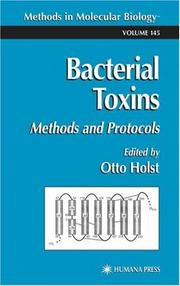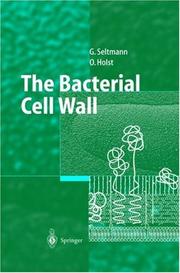| Listing 1 - 9 of 9 |
Sort by
|

ISBN: 0896036049 9786610820443 1280820446 1592590527 Year: 2000 Publisher: Totowa, NJ : Humana Press : Imprint: Humana,
Abstract | Keywords | Export | Availability | Bookmark
 Loading...
Loading...Choose an application
- Reference Manager
- EndNote
- RefWorks (Direct export to RefWorks)
The interest of investigators across a broad spectrum of scientific dis- plines has been steadily stimulated by the field of bacterial toxin research, an area that makes use of a large variety of biological, chemical, physicochemical, and medically oriented approaches. Researchers studying bacterial toxins need to be acquainted with all these disciplines in order to work effectively in the field. To date, there has been no published collection offering detailed descr- tions of the techniques and methods needed by researchers operating across the field’sdiverse areas. The present volume Bacterial Toxins: Methods and Pro- cols, is intended to fill this gap. Bacterial Toxins: Methods and Protocols consists of two sections: one on protein toxins (15 chapters) and one on endotoxins (5 chapters). Each s- tion is introduced by an overview article (Chapters 1 and 16). The protocols collected represent state-of-the-art techniques that each have high impact on future bacterial toxin research. All methods are described by authors who have regularly been using the protocol in their own laboratories. Included in each chapter is a brief introduction to the method being described.
Bacterial toxins -- Research -- Methodology. --- Electronic books. -- local. --- Microbial toxins. --- Bacterial toxins --- Toxins, Biological --- Biological Factors --- Bacterial Toxins --- Chemicals and Drugs --- Human Anatomy & Physiology --- Health & Biological Sciences --- Animal Biochemistry --- Research --- Methodology --- Agrotechnology and Food Sciences. Toxicology --- Methodology. --- Natural Toxins --- Natural Toxins. --- Toxins --- Bacterial antigens --- Microbial toxins --- Microbiology. --- Microbial biology --- Biology --- Microorganisms
Book
ISBN: 1617791016 9781617791017 1617791024 Year: 2011 Publisher: Totowa, NJ : Humana Press : Imprint: Humana,
Abstract | Keywords | Export | Availability | Bookmark
 Loading...
Loading...Choose an application
- Reference Manager
- EndNote
- RefWorks (Direct export to RefWorks)
Interest in the field of microbial toxins is ever growing and spreading across a broad spectrum of scientific disciplines. In an effort to supplement the available reference texts on toxins, Microbial Toxins: Methods and Protocols includes protocols on mold fungus toxins, with some focus on aflatoxins. Intended to support a wide variety of researchers, Microbial Toxins: Methods and Protocols presents the reader with biological, chemical, physical, and medical approaches, as well as state-of-the-art research techniques. Divided into three convenient sections, this detailed volume covers bacterial protein toxins, endotoxins, and mold fungus toxins. Written in the highly successful Methods in Molecular Biology™ series format, chapters contain introductions to their respective topics, lists of the necessary materials and reagents, step-by-step, readily reproducible laboratory protocols, and notes on troubleshooting and avoiding known pitfalls. Authoritative and accessible, Microbial Toxins: Methods and Protocols seeks to serve both professionals and novices with its well-honed methodologies in an effort to further our knowledge of this essential field.
Microbial toxins --- Toxins, Biological --- Biological Factors --- Publication Formats --- Chemicals and Drugs --- Publication Characteristics --- Laboratory Manuals --- Human Anatomy & Physiology --- Biology --- Health & Biological Sciences --- Animal Biochemistry --- Microbiology & Immunology --- Biological Toxins --- Biologic Agents --- Biologic Factors --- Biological Factor --- Factor, Biologic --- Factor, Biological --- Factors, Biological --- Biological Agents --- Agents, Biologic --- Agents, Biological --- Biologic Factor --- Factors, Biologic --- Microbiology. --- Bacteriology. --- Microbiology --- Microbial biology --- Microorganisms
Book
ISBN: 1493969587 1493969560 Year: 2017 Publisher: New York, NY : Springer New York : Imprint: Humana,
Abstract | Keywords | Export | Availability | Bookmark
 Loading...
Loading...Choose an application
- Reference Manager
- EndNote
- RefWorks (Direct export to RefWorks)
This second edition volume expands on the previous editions with detailed protocols on (cyano) bacterial and mold fungus toxins, and a specific focus on Gram-negative endotoxins (lipopolysaccharides). The chapters in Microbial Toxins: Methods and Protocols, Second Edition present techniques that cover topics such as detection of cholera toxin by an immunochromatographic test strip; label-free immune-sensors for the fast detection of Listeria in food; endotoxin removal from Escherichia coli bacterial lysate using biphasic liquid system; and micromethods for isolation and structural characterization of lipid A, and polysaccharide regions of bacterial lipopolysaccharides. Written in the highly successful Methods in Molecular Biology series format, chapters include introductions to their respective topics, lists of the necessary materials and reagents, step-by-step, readily reproducible laboratory protocols, and tips on troubleshooting and avoiding known pitfalls. Cutting-edge and practical, Microbial Toxins: Methods and Protocols, Second Edition is a valuable and useful resource for scientists who are interested in this field, and is a great tool for researchers who are looking to learn about new, particular techniques to further enhance their work.
Microbiology. --- Microbial biology --- Biology --- Microorganisms

ISBN: 3540426086 3642076483 3662048787 Year: 2002 Publisher: Berlin : Springer,
Abstract | Keywords | Export | Availability | Bookmark
 Loading...
Loading...Choose an application
- Reference Manager
- EndNote
- RefWorks (Direct export to RefWorks)
The bacterial cell wall represents a very complex structure disconnecting the interior of single-cell organisms from the environment, thus protecting, but also enabling, them to interact with the surrounding milieu and to exchange both substances and information. Knowledge of the biochemistry of the cell wall (components) and the genetic background helps to understand their significance with regard to microbiology and immunology of bacteria. This book represents the second edition of a publication which was presented nearly 20 years ago in the German language (Die bakterielle Zellwand). Since that time our knowledge in this field has been significantly enlarged. Therefore, the manuscript had to be completely revised and updated. To maintain both the size and the introductory character of the book at least to a great extent, the authors had to restrict the presented material to that which appears basic and most important. This requirement must inevitably bring about many subjective factors. As pointed out in the first edition, the term cell wall was not taken too strictly. Since the constituents located outside the cytoplasmic membrane are frequently difficult to divide in structure, localisation, and/or function into true cell wall components and supplementary substances, they are all at least briefly mentioned.
579.234 --- Bacterial cell walls --- #abib:almm --- Bacterial membranes --- Cell walls, Bacterial --- Bacteria --- Cell membranes --- Cell wall. --- Bacterial cell walls. --- 579.234 Cell wall. --- Cell wall --- Bacteriology. --- Microbiology. --- Cell biology. --- Biochemistry. --- Cell Biology. --- Biochemistry, general. --- Biological chemistry --- Chemical composition of organisms --- Organisms --- Physiological chemistry --- Biology --- Chemistry --- Medical sciences --- Cell biology --- Cellular biology --- Cells --- Microbial biology --- Microorganisms --- Microbiology --- Composition
Book
Year: 2020 Publisher: Frontiers Media SA
Abstract | Keywords | Export | Availability | Bookmark
 Loading...
Loading...Choose an application
- Reference Manager
- EndNote
- RefWorks (Direct export to RefWorks)
This eBook is a collection of articles from a Frontiers Research Topic. Frontiers Research Topics are very popular trademarks of the Frontiers Journals Series: they are collections of at least ten articles, all centered on a particular subject. With their unique mix of varied contributions from Original Research to Review Articles, Frontiers Research Topics unify the most influential researchers, the latest key findings and historical advances in a hot research area! Find out more on how to host your own Frontiers Research Topic or contribute to one as an author by contacting the Frontiers Editorial Office: frontiersin.org/about/contact
Medicine --- Immunology --- Lipids --- Allergy --- Airways --- Inflammation
Book
Year: 2020 Publisher: Frontiers Media SA
Abstract | Keywords | Export | Availability | Bookmark
 Loading...
Loading...Choose an application
- Reference Manager
- EndNote
- RefWorks (Direct export to RefWorks)
This eBook is a collection of articles from a Frontiers Research Topic. Frontiers Research Topics are very popular trademarks of the Frontiers Journals Series: they are collections of at least ten articles, all centered on a particular subject. With their unique mix of varied contributions from Original Research to Review Articles, Frontiers Research Topics unify the most influential researchers, the latest key findings and historical advances in a hot research area! Find out more on how to host your own Frontiers Research Topic or contribute to one as an author by contacting the Frontiers Editorial Office: frontiersin.org/about/contact
Lipids --- Allergy --- Airways --- Inflammation
Book
Year: 2020 Publisher: Frontiers Media SA
Abstract | Keywords | Export | Availability | Bookmark
 Loading...
Loading...Choose an application
- Reference Manager
- EndNote
- RefWorks (Direct export to RefWorks)
This eBook is a collection of articles from a Frontiers Research Topic. Frontiers Research Topics are very popular trademarks of the Frontiers Journals Series: they are collections of at least ten articles, all centered on a particular subject. With their unique mix of varied contributions from Original Research to Review Articles, Frontiers Research Topics unify the most influential researchers, the latest key findings and historical advances in a hot research area! Find out more on how to host your own Frontiers Research Topic or contribute to one as an author by contacting the Frontiers Editorial Office: frontiersin.org/about/contact
Medicine --- Immunology --- Lipids --- Allergy --- Airways --- Inflammation --- Lipids --- Allergy --- Airways --- Inflammation
Book
ISBN: 0080923240 9786612737428 1282737422 0123745462 9780080923246 9780123745460 6612737425 9781282737426 Year: 2009 Publisher: Amsterdam Boston Academic Press/Elsevier
Abstract | Keywords | Export | Availability | Bookmark
 Loading...
Loading...Choose an application
- Reference Manager
- EndNote
- RefWorks (Direct export to RefWorks)
This book presents in an easy-to-read format a summary of the important central aspects of microbial glycobiology, i.e. the study of carbohydrates as related to the biology of microorganisms. Microbial glycobiology represents a multidisciplinary and emerging area with implications for a range of basic and applied research fields, as well as having industrial, medical and biotechnological implications.Key Features and Benefits* Individual chapters provided by leading international scientists in the field yield insightful, concise and stimulating reviews. - Provides research
Glycoconjugates. --- Glycomics. --- Pathogenic microorganisms -- Identification. --- Animal Biochemistry --- Microbiology & Immunology --- Human Anatomy & Physiology --- Biology --- Health & Biological Sciences --- Pathogenic microorganisms --- Glycobiology --- Genomics --- Molecular biology --- Carbohydrates --- Diagnostic microbiology
Digital
ISBN: 9780080923246 0080923240 9780123745460 0123745462 9786612737428 6612737425 1282737422 9781282737426 Year: 2009 Publisher: Boston Academic Press/Elsevier
Abstract | Keywords | Export | Availability | Bookmark
 Loading...
Loading...Choose an application
- Reference Manager
- EndNote
- RefWorks (Direct export to RefWorks)
This book presents in an easy-to-read format a summary of the important central aspects of microbial glycobiology, i.e. the study of carbohydrates as related to the biology of microorganisms. Microbial glycobiology represents a multidisciplinary and emerging area with implications for a range of basic and applied research fields, as well as having industrial, medical and biotechnological implications. Key Features and Benefits * Individual chapters provided by leading international scientists in the field yield insightful, concise and stimulating reviews. - Provides researchers with an overview and synthesis of the latest research * Each chapter begins with a brief 200 word Summary/Abstract detailing the topic and focus of the chapter, as well as the concepts to be addressed. - Allows researchers to see at a glance what each chapter will cover * Each chapter includes a Research Focus Box - Identifies important problems that still need to be solved and areas that require further investigation.
| Listing 1 - 9 of 9 |
Sort by
|

 Search
Search Feedback
Feedback About UniCat
About UniCat  Help
Help News
News